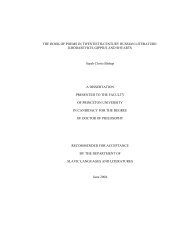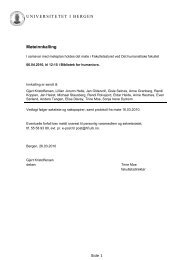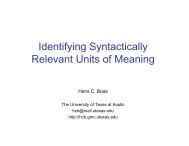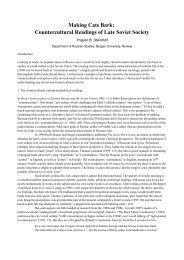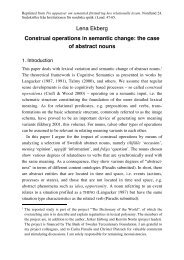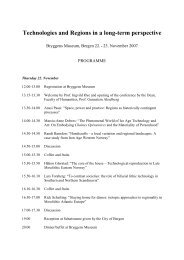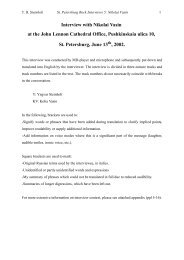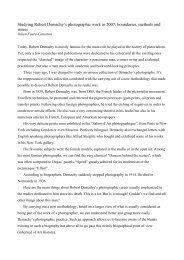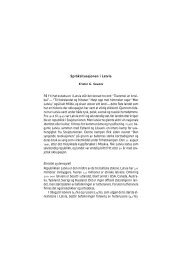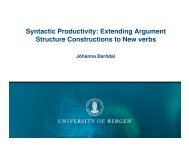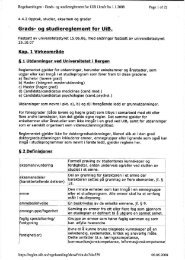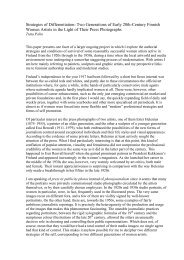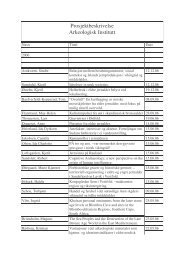Negative evidence and the raw frequency fallacy* - CiteSeerX
Negative evidence and the raw frequency fallacy* - CiteSeerX
Negative evidence and the raw frequency fallacy* - CiteSeerX
Create successful ePaper yourself
Turn your PDF publications into a flip-book with our unique Google optimized e-Paper software.
70 A. Stefanowitsch<br />
that negative corpus <strong>evidence</strong> can be adduced for a pet case of syntactic<br />
<strong>the</strong>orizing (note that among <strong>the</strong> significantly absent collexemes of <strong>the</strong><br />
ditransitive complementation pattern in Table 5, <strong>the</strong>re are a large<br />
number of famously non-ditransitive verbs, e. g., suggest, provide, say,<br />
describe, etc.).<br />
One may now argue that even if such negative corpus <strong>evidence</strong> can be<br />
obtained, it does not add any insights that could not also be arrived at<br />
by introspective acceptability judgments at best (e. g., for say, explain,<br />
whisper), it will confirm what we know from intuition anyway, in <strong>the</strong><br />
worst case it will never yield enough data to decide <strong>the</strong> issue (e. g., oxidise)<br />
or contradict generally agreed-upon acceptability judgments (e. g.,<br />
donate). There are two reasons why this argument is wrong: first, unlike<br />
acceptability judgments, negative corpus <strong>evidence</strong> meets <strong>the</strong> st<strong>and</strong>ards of<br />
scientific research. Second, it is only such corpus <strong>evidence</strong> that will allow<br />
us to make principled statements about what is <strong>and</strong> is not possible: if we<br />
hypo<strong>the</strong>size, based on acceptability judgments, that whisper ditransitive<br />
is impossible, a single counterexample can prove this wrong. While<br />
such counterexamples may not occur even in very large corpora, <strong>the</strong>y<br />
are still easy to come by in <strong>the</strong> age of <strong>the</strong> Internet. A web search quickly<br />
turns up counterexamples produced by native speakers of (British) English,<br />
both with clausal <strong>and</strong>, more crucially, with nominal objects:<br />
(2) a. ... when I first beheld you <strong>the</strong> instinct of Nature whispered me<br />
that we were in some degree related ... (Jane Austen, Love <strong>and</strong><br />
Friendship, Letter 11)<br />
b. She had not been allowed to ... to bury <strong>the</strong> two people she had<br />
loved most in <strong>the</strong> world ... to whisper <strong>the</strong>m a last goodbye. (Meg<br />
Hutchinson, Peppercorn Woman)<br />
Of course, <strong>the</strong>se examples can in turn be questioned; <strong>the</strong>y may reflect<br />
older stages of <strong>the</strong> language (Jane Austen wrote Love <strong>and</strong> Friendship<br />
around 1790), <strong>the</strong>y may reflect regional dialects (Meg Hutchinson lives<br />
in Staffordshire), etc. However, <strong>the</strong> fact remains that we have objective<br />
au<strong>the</strong>ntic examples pitched against subjective intuition. In contrast, <strong>the</strong><br />
negative corpus <strong>evidence</strong> obtained from <strong>the</strong> BNC gives us an objective<br />
basis for arguing that, even though utterances like (2) can occur, <strong>the</strong>y<br />
are very marginal. This allows us to uphold <strong>the</strong> useful generalization<br />
that communication verbs can be used with ditransitive syntax if <strong>the</strong>y<br />
refer to <strong>the</strong> type of message communicated, but not if <strong>the</strong>y refer to <strong>the</strong><br />
manner in which it is communicated (Pinker 1989), even though we have<br />
to reformulate it as a strong statistical tendency instead of a categorical<br />
constraint. The same holds for donate. Even if we generously admit both<br />
(1a <strong>and</strong> 1b) as counterexamples, we can still point out that donate would



